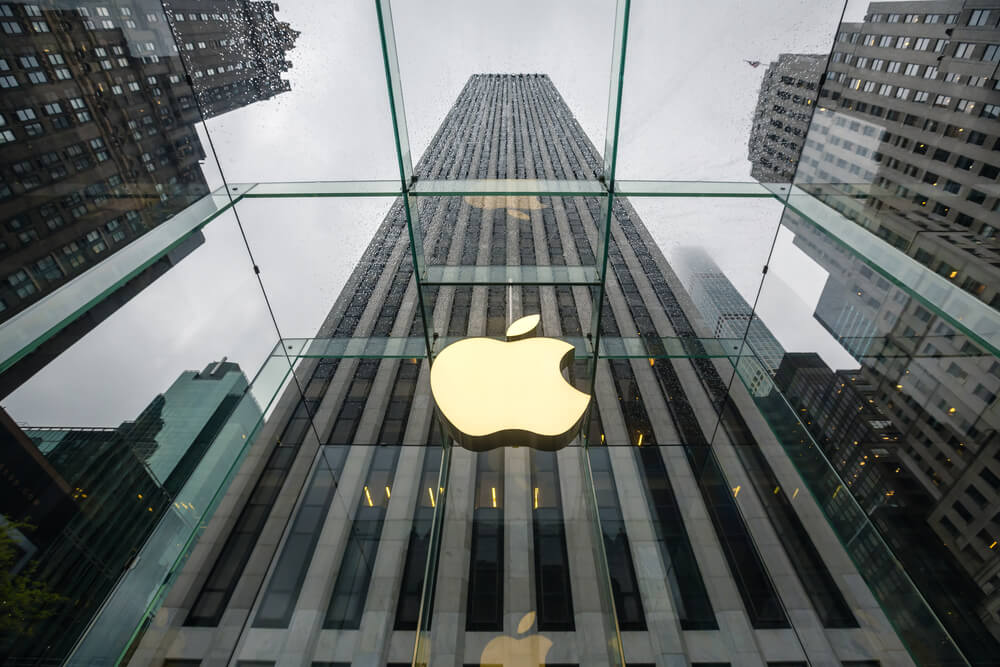Stocks ended an indecisive day of trading more or less where they started as traders try to make sense of newly pessimistic views on the economy.
They’re also parsing another troubling drop in long-term bond yields Monday, which many see as a warning sign of a possible recession.
Large-company stocks ended broadly lower, led by drops in big technology companies.
Apple fell 1.2 percent after announcing several new services including streaming video and news.
Small-company stocks fared better.
Investors were weighing new economic data pointing at slower global growth. Bond yields fell, adding to a sharp decline that contributed to a wave of selling last week.
Technology companies accounted for much of the decline. Chipmaker Micron Technology dropped 3.4 percent.
Financial, communication and health care stocks also pulled the market lower. Synchrony Financial slid 1.8 percent, Twitter slid 1.7 percent and CVS Health gave up 2.7 percent.
Consumer discretionary stocks notched gains. Homebuilders Lennar and D.R. Horton were among the biggest gainers, adding 3.6 percent and 3.1 percent, respectively. Several retailers also rose, led by Foot Locker, which climbed 2.5 percent.
Stocks spent much of the morning wavering between gains and losses as investors weighed a survey showing that business economists foresee a significant slowdown in U.S. growth over the next two years. That’s in sharp contrast to the Trump administration’s predictions that growth will accelerate in the coming years.
The market’s recent skid follows what has been a strong start to the year on Wall Street as stocks rebounded from a steep slide at the end of 2018. The bull market for U.S. stocks recently marked its 10th anniversary and is now the longest of all time.
Monday’s shaky start to the week for markets came amid a lull in news on the tariffs war between the United States and China. Trade talks are due to resume Thursday in Beijing.
U.S. stock indexes did not appear to have a significant move either way in response to news that the special counsel’s probe into Russian meddling in the 2016 presidential election concluded without finding evidence that the Trump campaign conspired or coordinated with Russia.
STOCK MARKET UPDATE
KEEPING SCORE: The S&P 500 edged down 2 points, or 0.1 percent, to 2,798. The Dow Jones Industrial Average rose 14 points, or 0.1 percent, to 25,516. The Nasdaq slipped 5 points, or 0.1 percent, to 7,637.
Bond prices rose. The yield on the 10-year Treasury note fell to 2.41 percent.
Major European stock indexes finished lower as uncertainty over Brexit continued.
ECONOMIC JITTERS: Citing a global slowdown and trade conflicts, economists from the National Association for Business Economics collectively project that growth will reach a modest 2.4 this year and just 2 percent in 2020. Still, the economists say they think a recession remains unlikely any time soon.
Worried investors have shifted money into bonds, sending yields lower. The yield on the 10-year Treasury slid to 2.39 percent from 2.45 percent late Friday.
That remains below the yield on the three-month Treasury bill, a worrying sign that in the past has preceded recessions. That “inversion” occurred on Friday and has spooked investors.
NOTHING TO SEE HERE: Wall Street appeared to shrug off the big news over the weekend on the outcome of Special Counsel Robert Mueller’s two-year investigation into Russia’s interference in the 2016 presidential election.
Attorney General William Barr issued a summary of the report Sunday, in which Mueller did not find evidence that President Donald Trump’s campaign conspired or coordinated with Russia to influence the election. Mueller also reached no conclusion on whether Trump obstructed justice.
What does this mean for investors? The end of the Russia probe alleviates big unknown policy risks for the market and has the potential to have a “real impact” on the White House’s agenda, including trade negotiations with China, according to analysts at Raymond James & Associates.
“The lack of additional indictments and the conclusion of the investigation should serve as a market positive and further lessens the (already low) odds of President Trump being removed from office via impeachment,” the analysts wrote in a note published early Monday. “On the international front, we see real impacts on trade negotiations with China as easing domestic pressure could embolden the President to seek a stronger trade deal.”
TRAVEL TRAUMA: Airline shares declined as major carriers continued to cancel flights due to the grounding of Boeing 737 Max aircraft as federal regulators continue to investigate two deadly crashes involving the plane model.
American Airlines fell 1 percent a day after the company said it will be canceling about 90 flights a day through April 24. The airline has 24 Boeing 737 Max aircraft in its fleet.
Southwest Airlines, which has 34 Max aircraft, is canceling, on average, 130 daily flights. Its shares slid 1.5 percent. Boeing fared better, adding 1.7 percent.
CROSSING THE STREAM: Apple dropped 1.8 percent after the consumer electronics giant disclosed details of its new subscription TV service and other new offerings, including upcoming subscriptions for games and news.
The service, dubbed Apple TV Plus, will be available this fall across several streaming devices and some smart TVs. It will also be free of ads. The company did not say how much the streaming service will cost or when exactly it will launch.
The new service will put Apple in direct competition with big streaming services including Netflix and Amazon Video. Apple is pushing digital subscriptions as it searches for new growth amid declining sales of its iPhones, long the company’s marquee product and main money maker.
BLACKOUT AVERTED: Media company Viacom rose 5 percent after the company reached a carriage deal with AT&T that would avert a blackout of its channels including Comedy Central and MTV to AT&T customers.
© The Associated Press. All rights reserved.




